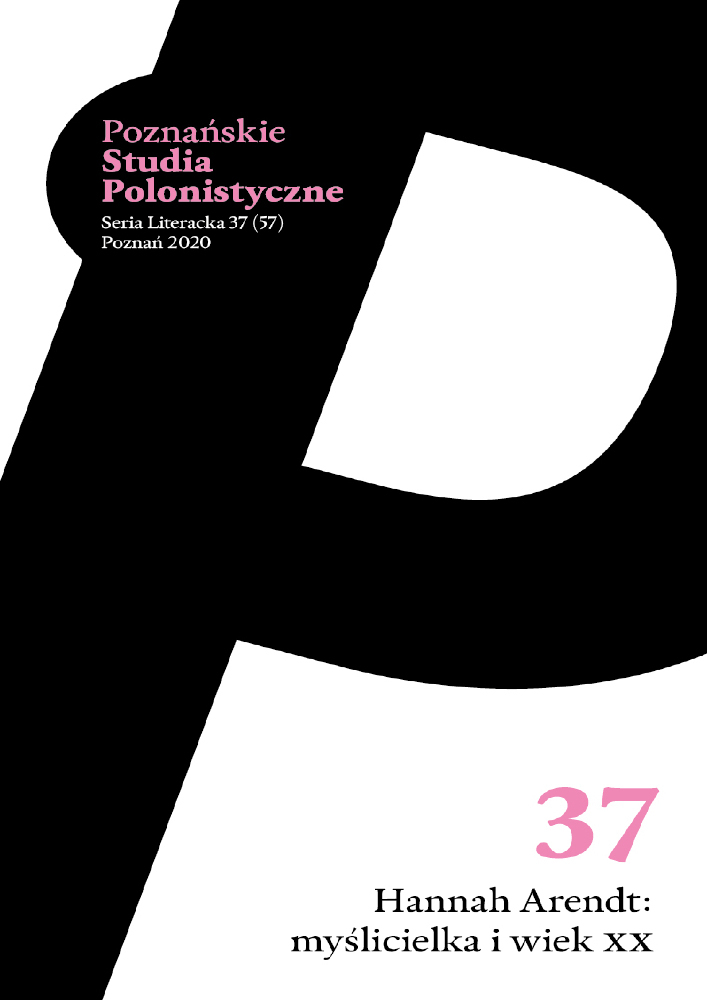Abstract
The article is an attempt at capturing the relationship between the lives and creative attitudes of Rahel Varnhagen, Hannah Arendt and Judith Butler. Starting with Varnhagen’s biography written by Arendt, the essay’s author wonders about the philosopher’s writing strategy. Instead of a classic reconstruction of life, the biographer offers a collage of excerpts from Rahel’s letters with extensive commentary. This form encourages one to read Rahel Varnhagen as a narration about the author and her own struggle with Jewish and female identity. The second relationship analysed in the essay is the impact of Hannah Arendt’s texts on Judith Butler’s writings. Despite the criticism of the philosopher’s writings, Arendt remains an unquestionable inspiration to Butler. The article also emphasises the difference
between the theoreticians: Arendt uses the strategy of mimicry (writing about identity in the form of a German Jew’s biography), while Butler writes a politically-engaged text, exposing herself and her identity.
References
Arendt Hannah (2002), Co pozostaje? (Günter Gaus rozmawia z Hannah Arendt), rozm. przepr. Günter Gaus, przeł. Jerzy Kałążny, „Przegląd Polityczny”, nr 55, s. 46-57.
Arendt Hannah (2008), Salon berliński, w: tejże, Salon berliński i inne eseje, przedm. i wybór tekstów Piotr Nowak, przeł. Mieczysław Godyń, Sebastian Szymański, Prószyński i S-ka, Warszawa, s. 33-43.
Arendt Hannah (2012), Rahel Varnhagen. Historia życia niemieckiej Żydówki z epoki romantyzmu, przeł. Katarzyna Leszczyńska, Fundacja Pogranicze, Sejny.
Borkowska Grażyna (1996), Cudzoziemki. Studia o polskiej prozie kobiecej, Wydawnictwo IBL, Warszawa.
Butler Judith (2014), Na rozdrożu. Żydowskość i krytyka syjonizmu, przeł. Michał Filipczuk, Wydawnictwo Krytyki Politycznej, Warszawa.
Kristeva Julia (2007), Hannah Arendt. Biografia, przeł. Jacek Levin, Wydawnictwo KR, Warszawa.
Leszczyńska Katarzyna (2012), Posłowie, w: Hannah Arendt, Rahel Varnhagen. Historia życia niemieckiej Żydówki z epoki romantyzmu, przeł. Katarzyna Leszczyńska, Fundacja Pogranicze, Sejny, s. 403-444.
Nowak Piotr (2008), Przedmowa, w: Hannah Arendt, Salon berliński i inne eseje, przedm. i wybór tekstów Piotr Nowak, przeł. Mieczysław Godyń, Sebastian Szymański, Prószyński i S-ka, Warszawa, s. 7-32.
Nowosielska Anna, Tiuryn Tomasz (2002), Sukno Penelopy, „Wysokie Obcasy”, dodatek do „Gazety Wyborczej”, nr 42, s. 6-14.
Pekaniec Anna (2010), Odzyskiwanie historii kobiet. Literatura dokumentu osobistego jako świadectwo, w: Krakowski Szlak Kobiet.
Przewodniczka po Krakowie emancypantek, t. 2, red. Ewa Furgał, Fundacja Przestrzeń Kobiet, Kraków, s. 23-37.
Rawska Hanna (2016), Spór o Izrael, „Przegląd Humanistyczny”, nr 1, s. 196-199.
Roszak Joanna (2013), Hannah Arendt, „Rahel Varnhagen”, „dwutygodnik. com”, nr 5, [dostęp: 3 lutego 2020], https://tinyurl.com/ybw6p6lb.
Rzanna Ewa (2010), Hannah Arendt. Dwie biografie, „Przegląd Polityczny”, nr 101, s. 138-146.
License
Authors
Authors of texts accepted for publication in „Poznańskie Studia Polonistyczne. Seria Literacka” are required to complete, sign and return to the editor's office the Agreement for granting a royalty-free license to works with a commitment to grant a CC sub-license.
Under the agreement, the authors of texts published in „Poznańskie Studia Polonistyczne. Seria Literacka” grant the Adam Mickiewicz University in Poznań a non-exclusive, royalty-free license and authorize the use of Attribution-NoDerivatives 4.0 International (CC BY-ND 4.0)Creative Commons sub-license.
The authors retain the right to continue the free disposal of the work.
Users
Interested Internet users are entitled to use works published in „Poznańskie Studia Polonistyczne. Seria Literacka” since 2016, for non-commercial purposes only, under the following conditions:
- attribution - obligation to provide, together with the distributed work, information about the authorship, title, source (link to the original work, DOI) and the license itself.
- no derivatives - the work must be preserved in its original form, without the author's consent it is not possible to distribute the modified work, such as translations, publications, etc.
Copyrights are reserved for all texts published before 2016.
Miscellaneous
Adam Mickiewicz University in Poznań retains the right to magazines as a whole (layout, graphic form, title, cover design, logo etc.).
